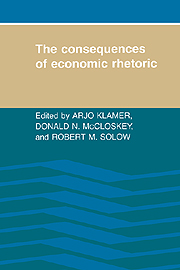Book contents
- Frontmatter
- Contents
- Preface
- The consequences of economic rhetoric
- PART I ECONOMIC RHETORIC: INTRODUCTION AND COMMENTS
- PART II ECONOMIC RHETORIC: FURTHER ARGUMENTS
- PART III ECONOMIC RHETORIC AMONG ECONOMISTS
- 9 Shall I compare thee to a Minkowski–Ricardo–Leontief–Metzler matrix of the Mosak–Hicks type? Or, rhetoric, mathematics, and the nature of neoclassical economic theory
- 10 On the brittleness of the orange equilibrium
- 11 The significance of significance: Rhetorical aspects of statistical hypothesis testing in economics
- 12 The rhetoric of self-interest: Ideology of gender in economic theory
- PART IV ECONOMIC RHETORIC IN POLITICS AND JOURNALISM
- PART V ECONOMIC RHETORIC: ITS RHETORIC AND ITS CONSEQUENCES
- 1 Appendix: Other contributors and participants
- Index
12 - The rhetoric of self-interest: Ideology of gender in economic theory
Published online by Cambridge University Press: 07 September 2010
- Frontmatter
- Contents
- Preface
- The consequences of economic rhetoric
- PART I ECONOMIC RHETORIC: INTRODUCTION AND COMMENTS
- PART II ECONOMIC RHETORIC: FURTHER ARGUMENTS
- PART III ECONOMIC RHETORIC AMONG ECONOMISTS
- 9 Shall I compare thee to a Minkowski–Ricardo–Leontief–Metzler matrix of the Mosak–Hicks type? Or, rhetoric, mathematics, and the nature of neoclassical economic theory
- 10 On the brittleness of the orange equilibrium
- 11 The significance of significance: Rhetorical aspects of statistical hypothesis testing in economics
- 12 The rhetoric of self-interest: Ideology of gender in economic theory
- PART IV ECONOMIC RHETORIC IN POLITICS AND JOURNALISM
- PART V ECONOMIC RHETORIC: ITS RHETORIC AND ITS CONSEQUENCES
- 1 Appendix: Other contributors and participants
- Index
Summary
Feminism and rhetoric: a parable
Rhetoric and Feminism met on a morning run around the lake at Wellesley College. They were both there to work on Economics, trying to get him into better shape to deal with changing realities.
rhetoric (breathing heavily): This is rough going. I can't seem to make these economists see the underlying assumptions that structure their models. They're all talking about me instead.
feminism (treading lightly): I know what you mean. They really cling to this notion that perfect self-interest rules in the market and perfect altruism rules in the home. They're certainly not maximizing our joint utility.
rhetoric: Let's get together. You concentrate on the ideological substance of their argument, showing how it benefits men. I'll use logic to show them that their assumptions are inconsistent.
feminism: YOU mean you'll divert them with Latin terms while I take away some of their privileges?
rhetoric: Well, if it doesn't work, we could always get married and settle down.
feminism: Yeah, but who's going to take care of the kids?
The contents of basic economics texts and research journals suggest that economists don't like to talk about inequality between men and women (Feiner and Morgan 1985). Most economists seem persuaded that gender inequalities lie beyond the purview of economic analysis, either in the realm of biological givens or sociological imponderables. In this chapter we hope to persuade otherwise and to show how and why this particular economic con- versation has been circumscribed. We argue that certain assumptions embodied in the rhetoric of economics have deafened most economists to the possibility that economic motives help explain inequality between the sexes.
- Type
- Chapter
- Information
- The Consequences of Economic Rhetoric , pp. 184 - 204Publisher: Cambridge University PressPrint publication year: 1989
- 18
- Cited by

